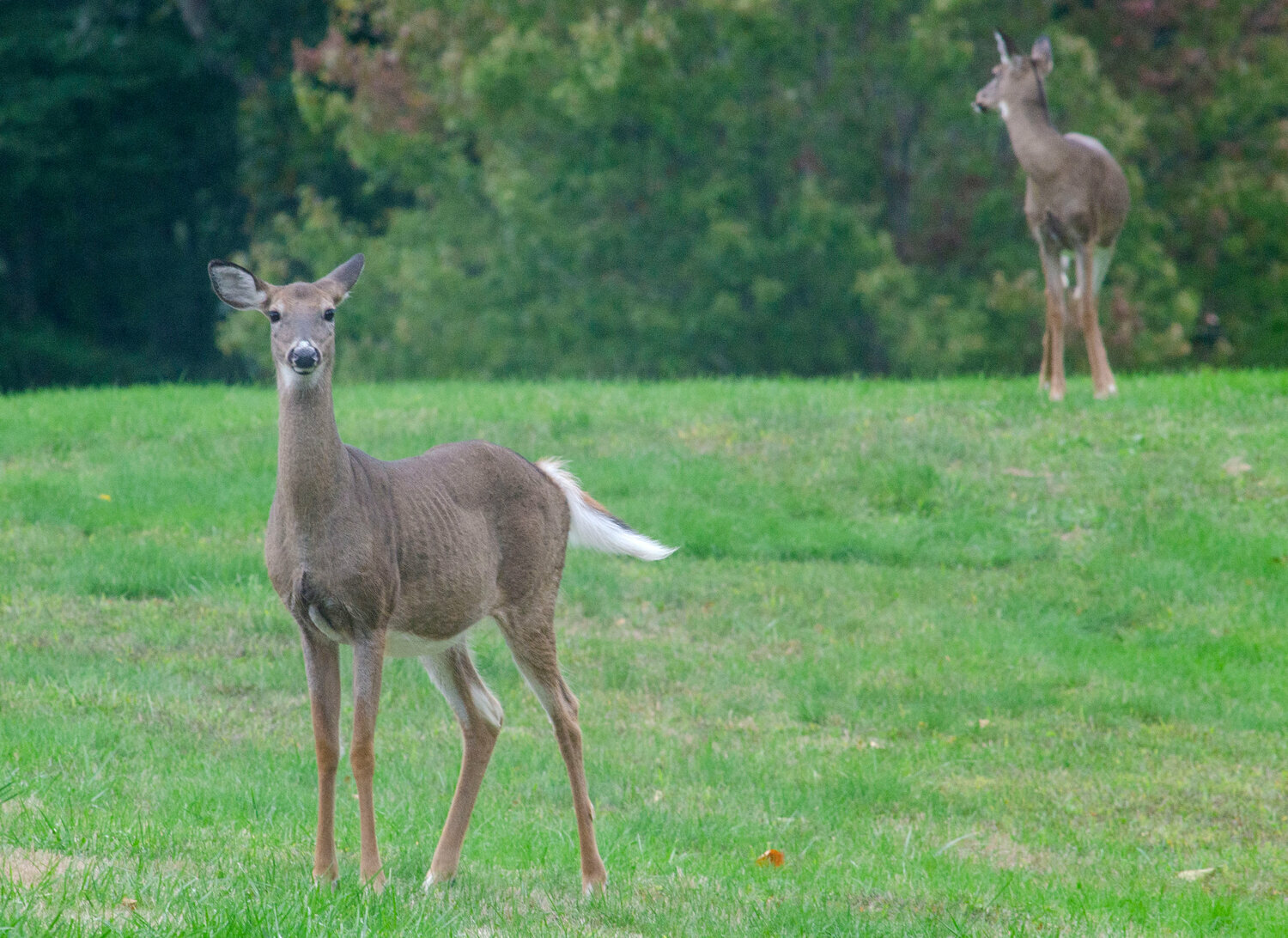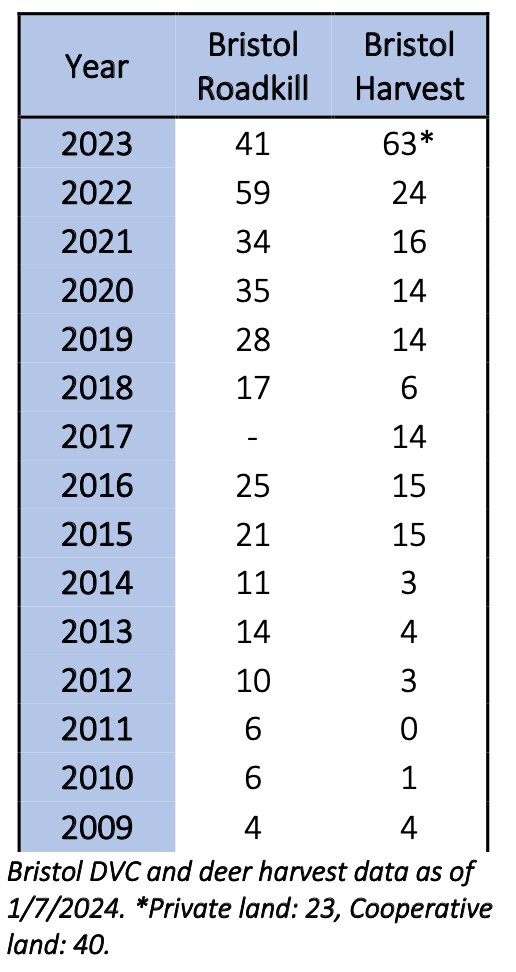Bristol Town Council continues hunting program despite citizen petition to end it
Citing information from DEM that the number of collisions with deer versus vehicles went down in 2023, corresponding with the highest number of deer harvested, the Town Council said continuing the hunting was in the best interest of the public.
This item is available in full to subscribers.
Please log in to continue |
Register to post eventsIf you'd like to post an event to our calendar, you can create a free account by clicking here. Note that free accounts do not have access to our subscriber-only content. |
Day pass subscribers
Are you a day pass subscriber who needs to log in? Click here to continue.
Bristol Town Council continues hunting program despite citizen petition to end it
Bristol’s first season in which deer hunters utilizing bows were permitted access to four Town-owned properties ended this week, on Jan. 31. How it went depends on who you ask.
Deer hunting consumed much of the last Town Council meeting on Wednesday, Jan. 17, as wildlife biologist Dylan Ferreira of the Rhode Island Department of Environmental Management (DEM) presented the results of the first hunting season on the same night that Bristol residents Warren and Sharon Wollschlager presented a petition calling for a ban on all deer hunting on Town-owned land.
The DEM’s provisional report revealed data that collisions between deer and vehicles declined as the harvesting of deer by hunters increased.
“Deer hunting is the most effective and economical option for managing deer populations, and is the primary management tool used by federal, state, and provincial wildlife agencies across North America,” said Ferreira, who explained in detail how other deer mitigation methods, such as translocation and fertility control, are cost prohibitive and have other limitations that makes them less successful.
Prior to Ferreira’s presentation, the Wollschlagers spoke in favor of their request for voter initiative to enact a proposed ordinance prohibiting deer hunting on Town property.
“Both Sharon and I have backgrounds in public health, and we had real concerns about the argument being made that there would be a correlation between the reduction in deer population and the incidence of tick borne disease,” said Wollschlager. “There's very little hard empirical data supporting that.”
Further, the Wollschlagers and the signatories to their petition, many of whom live adjacent to the Town properties that have been opened to hunting, are concerned about safety as well as the cruelty of bow hunting.
“We recognize that this is a new program. We also recognize that DEM just came out with a study today,” said Wollschlager. “But our concerns have really not been alleviated since we first heard that this program was going to go into place.”
The Wollschlagers introduced Dennis Tabella, the RI Director of Defenders of Animals, who asserted that hunting — and bow hunting in particular — is not an effective means of long-term population control. Citing South Kingstown, he noted, “They're killing the most deer out of all the towns in Rhode Island, and they have got the biggest collision problem. Doesn’t that tell you that killing more deer doesn't get rid of your collision problem?”
On the issue of cruelty, Tabella asserted there have been a lot of studies about unrecovered deer surviving for days before succumbing to their wounds, as well as dozens of studies from across the country that indicate that bow hunting is inhumane and wasteful.
“You could kill every deer in Bristol and you would still have an issue,” he said. Tabella also noted that DEM gets money from hunting. “It’s blood money,” he said.
While that is one way to look at it, state wildlife management officials, including Ferreira, see it differently. Tabella was presumably referring to the Pittman-Robertson (P-R) Act, first passed in 1937, which imposes an excise tax on the sale of firearms and ammunition to help fund wildlife conservation in the United States. Now known as Federal Aid in Wildlife Restoration, the revenues generated from these taxes are funneled to state wildlife agencies for their conservation efforts and hunter education programs, and has delivered well over $7 billion to the states sine its inception.
Ferreira presented the almost-final results of Bristol’s bow-hunting season. As of Jan. 7, 63 deer had been harvested in Bristol, 37 of which were taken from the four town properties, including 13 from Hopeworth, 12 from 100 Acre Woods, 10 from Minturn, and 2 from Skaters Pond.
“Last time I was here, I mentioned if we had a harvest of 40, I'd be impressed….we basically tripled our harvest from last year and quadrupled our harvest from the 5-year average,” he said. He also noted that there were 41 vehicle collisions reported in Bristol in 2023, a 31% reduction from the year prior. “We've had no general public or hunter injuries, and that's mandated by law to report,” he added.
“The hunting is working,” said Ferreira. “But, like with all of the the methods, once you pick your foot off the gas, that's when the population can bounce back…We've really hammered the deer population, and we're going to see a reduction in harvest next year because we did such a good job harvesting deer. So then that's when you're going see this new balance where the population will stabilize.”
Chief Lynch corroborated Ferreira’s claims about safety.
“Each week I tasked Lt. St. Pierre with meeting with the supervisors and the officers in collecting all of the data…and after 12 weeks of reporting we did not find a public safety hazard to the residents of the town of Bristol,” said Lynch. “There were no accidents, there were no injured deer running at large. We did have some calls related to folks that were upset about the hunting that was going on, and we notified DEM.”
Though none of the Town Councilors appear to be hunting enthusiasts, they were united in accepting the advice of DEM and Ferreira that continuing the program is the best way to handle the deer overpopulation issue. Councilor Tony Teixeira moved to deny the Wollschlager’s request, and Councilor Aaron Ley seconded the motion.
“I think we have a responsibility to work with residents for the safety of all,” Teixeira said.
“While I understand we have limited data, there is value in the data we are seeing with a 30 percent reduction in collisions,” said Ley. “It’s a real public safety concern, those collisions, and if can get these numbers down then Bristol is safer.”
“They're beautiful creatures. I don't hear anyone here on the Council advocating for hunting,” said Council Chairman Nathan Calouro. “What I hear is advocating for all the things that have already been stated controlling the deer population.”
The Council then voted unanimously to resume the program in the Fall of 2024.









